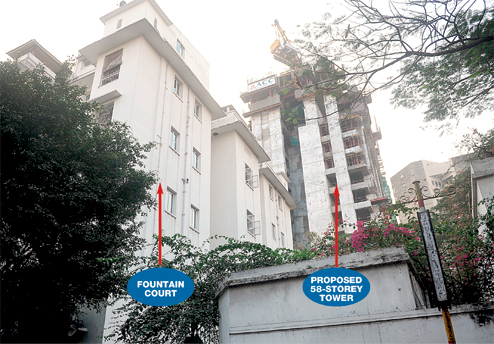
The two buildings involved in the litigation, as seen from Little Russel Street. Picture by Amit Datta
Calcutta High Court has dismissed a lawsuit seeking a stay on the construction of a 58-storey building overlooking Little Russel Street, rejecting the unusual contention that the 'right to light' of residents of a neighbouring building would be compromised by the skyscraper.
'In my prima facie opinion, there would only be partial diminution of light on the western side.... The diminution of light is not substantial... and so injunction should not be issued,' Justice I.P. Mukerji said in his judgment on Friday.
ITC Limited, which owns the five-storey building called Fountain Court where several of its top executives stay, had filed the petition in August 2013. More than 12 floors of Chowringhee Residency, which aims to be Calcutta's tallest building by far, have been built since.
Sources said ITC was likely to appeal against the order. 'Cases on right to light are few and far between in India, which is why this case aroused interest and was very closely observed in the high court,' Debanjan Mandal, partner at law firm Fox Mandal, told Metro.

'The field of right to light and air is a niche concept in India and there is hardly any settled law on this point. While the law is fairly developed in the West, it is difficult to adopt their standards as they have very different climatic conditions,' he said.
Four top real estate players - the Mani Group, Diamond Group and Alcove Realty from Calcutta and the Bangalore-based Sattva Group - are jointly promoting the project with a construction plan sanctioned by the Calcutta Municipal Corporation.
Construction at the site started in end-2013 and progressed even as the petition filed by ITC awaited the court's verdict. Going by the sanctioned plan, Chowringhee Residency will tower over some of the city's more prominent highrises, including South City, Urbana and Unitech.
The high court case that culminated in Friday's order going against ITC had seen an engrossing courtroom battle involving the top legal brains. Ram Jethmalani was the counsel for Chowringhee Residency Pvt Ltd while Ahin Chowdhury represented ITC.
A lawyer not connected with the case said ITC's plea, if accepted, would have meant that no building higher than five storeys could come up on the 214-cottah plot on the western side of 7/1 Fountain Court.
The company had submitted a report by a London-based firm, Gordon Ingram Associates, to buttress its claim that the skyscraper in the making would reduce the light and air that Fountain Court had been getting.
ITC, whose businesses range from tobacco to FMCG, said Fountain Court had been enjoying ample light and air all these years and nobody should be allowed to snatch the residents of what was rightfully theirs.
The real estate consortium, on the other hand, argued that it couldn't be asked to stop work after having applied for and got the civic authority's seal of approval on its construction plan.
After months of hearing arguments by both sides, the high court said that ITC had failed to make out a prima facie case for grant of injunction. 'In the facts of the case, an order of injunction would be oppressive,' states Justice Mukerji's order.
But the order leaves the door ajar for ITC to claim damages if it can establish that there would be substantial loss of light and air at Fountain Court because of Chowringhee Residency.










